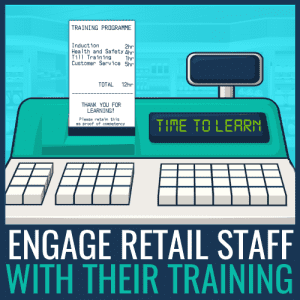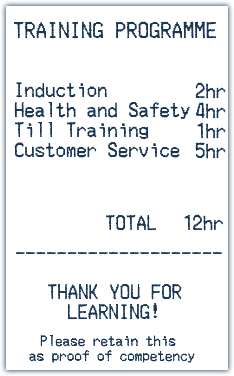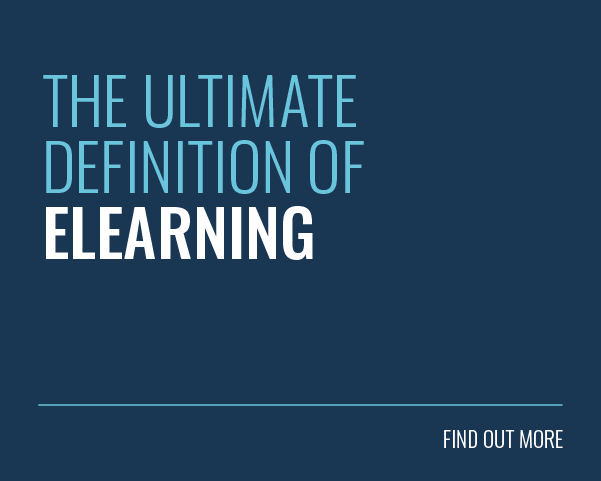 As we have explores, the future of retail promises big changes. But engaging employees with their training can be hard enough at the best of times. For retailers, the struggle is even harder. Learning managers in this sector have to deal with ever-changing consumer demands, high staff turnover and a future that’s been made uncertain by the online shopping boom.
As we have explores, the future of retail promises big changes. But engaging employees with their training can be hard enough at the best of times. For retailers, the struggle is even harder. Learning managers in this sector have to deal with ever-changing consumer demands, high staff turnover and a future that’s been made uncertain by the online shopping boom.
It’s not all doom and gloom though. Imagine being a training manager for a less-dynamic field like, say, elevator maintenance. Although initially interesting, it doesn’t take long before you’ve said all you can say about fixing a lift, and you can’t really blame the employees for getting a bit bored.
Retail changes every day. All it takes is for somebody to use an obscure ingredient in their drizzle cake on the Great British Bake Off, and all of a sudden, thousands of customers across the country will be asking your employees where the yuzu section is.
As a learning manager in a retail environment, you’re blessed with an infinite number of opportunities to keep your training fresh and interesting, but how do you get your employees to share your enthusiasm?
Convince Them That Retail Could Be a Career
 As a field with a low barrier to entry, many of the staff are fresh-faced scholars who likely see the job as a way to earn a bit of extra pocket money at the weekend. There’s a good chance that they haven’t even considered the possibility that they might have a career in retail.
As a field with a low barrier to entry, many of the staff are fresh-faced scholars who likely see the job as a way to earn a bit of extra pocket money at the weekend. There’s a good chance that they haven’t even considered the possibility that they might have a career in retail.
For one reason or another, retail has earned the unjust stigma of not being a real job. The fact is that a job in retail requires a varied skillset, enough to rival any brain surgeon or rocket scientist, not to mention a plethora of branching career pathways. If you’re looking to engage retail employees with their training (and their jobs in general), this is the first lesson you should try to impart.
 Make Development part of Managers’ KPIs
Make Development part of Managers’ KPIs
It shouldn’t be a shock to learn that the purpose of a retail business is to sell as many products as possible to as many customers as possible. It’s all too easy to hold this singular goal in high regard and forsake all other goals.
If the culture of the businesses focuses primarily on profit, that will be the message that’s communicated through all levels. By focusing on development and growth, profit will become a welcome consequence.
Make sure that your store managers are judged not only on how much money the store makes, but on the effort they put into developing their people.
If all employees feel part of an environment that encourages growth, they are more likely to see training as part of their job, and thus more likely to engage with their training.
 Don’t Restrict the Training to Work Hours
Don’t Restrict the Training to Work Hours
Even though profit shouldn’t be the sole focus of the organisation, it is the raison d’être of the retail industry. As such, retail employees are going to be focused on converting every customer that comes through the door. If their training programme is so cumbersome that they have to choose between selling and learning, they’ll favour the former.
One of the key benefits of an online learning solution is that the employees can take their training wherever they are. This gives the learners the opportunity to train in their own time and at their own pace. Now they just need an incentive to devote their free time to improve their skills. Luckily, we can…
Make it More Than Just Training
When it comes to getting employees engaged with their training, those in the retail sector are not alone. Learner engagement has been the single biggest challenge in the entire L&D industry. When you consider the dull eLearning units and training videos of the past, it’s not hard to see why.
Luckily, learning technology has made some huge strides in improving the user experience and creating training that can compete with other media.
 Gamification: By making the learning experience more game-like, you can take advantage of several quirks of human nature. Awarding badges let you exploit the need for reward and the urge to collect. You can add structure by framing your training in levels that progressively unlock as the learner earns experience points. You can even add leaderboards that tap into the learners’ competitive side.
Gamification: By making the learning experience more game-like, you can take advantage of several quirks of human nature. Awarding badges let you exploit the need for reward and the urge to collect. You can add structure by framing your training in levels that progressively unlock as the learner earns experience points. You can even add leaderboards that tap into the learners’ competitive side.
 Social Features: Online learning has been criticised in the past for removing the human aspect of the learning experience. Now, you can turn your LMS into a social network that lets all employees interact with each other while they learn. Aside from being a more engaging way to learn, this lets you encourage and capture informal learning.
Social Features: Online learning has been criticised in the past for removing the human aspect of the learning experience. Now, you can turn your LMS into a social network that lets all employees interact with each other while they learn. Aside from being a more engaging way to learn, this lets you encourage and capture informal learning.
 Personalisation: The biggest online platforms, from Facebook to Amazon, owe a lot of their success to the fact that they provide a tailored experience for each user. An online learning platform that doesn’t include some element of personalisation will seem outdated by comparison and your employees won’t want to use it. If your learners can create their own profiles and venture on their own learning journey, they’ll be more inclined to explore and seek out the training that’s most relevant to them.
Personalisation: The biggest online platforms, from Facebook to Amazon, owe a lot of their success to the fact that they provide a tailored experience for each user. An online learning platform that doesn’t include some element of personalisation will seem outdated by comparison and your employees won’t want to use it. If your learners can create their own profiles and venture on their own learning journey, they’ll be more inclined to explore and seek out the training that’s most relevant to them.
As a provider of learning technologies that focus on engaging learners, we’ve seen at first hand just how successful these approaches can be. If you’d like to find out more about the possibilities of online learning in a retail environment, take a look at the following case studies:








